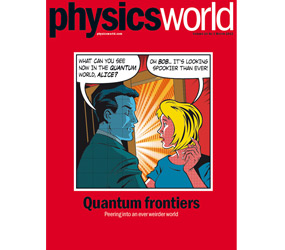2013
-

March's Physics World : Space race underway to create quantum satellite
In this month’s special edition of Physics World, focusing on quantum physics, Thomas Jennewein and Brendon Higgins from the Institute for Quantum Computing at the University of Waterloo, Canada, describe how a quantum space race is under way to create the world’s first global quantum-communication network. The field of quantum communication – the science of […]
-

February's Physics World: Doubt cast on Sir Bernard Lovell's 'brainwashing'
In this month’s edition of Physics World, science writer Richard Corfield casts doubt on the alleged “brainwashing” of the late British astronomer Sir Bernard Lovell by the Soviets at the height of the Cold War and explains how his trips beyond the Iron Curtain laid the foundations for the easing of geopolitical tensions between the […]
-

Researchers analyse 'rock dissolving' method of geoengineering
The benefits and side effects of dissolving particles in our ocean’s surfaces to increase the marine uptake of carbon dioxide (CO2), and therefore reduce the excess amount of it in the atmosphere, have been analysed in a new study published today. The study, published today, 22 January, in IOP Publishing’s journal Environmental Research Letters, assesses […]
-

Breath test identifies bacteria's 'fingerprint'
Scientists have identified the chemical ‘fingerprints’ given off by specific bacteria when present in the lungs, potentially allowing for a quick and simple breath test to diagnose infections such as tuberculosis. Publishing their study today, 11 January, in IOP Publishing’s Journal of Breath Research, the researchers have successfully distinguished between different types of bacteria, as […]
-

New antimatter method to provide 'a major experimental advantage'
Researchers have proposed a method for cooling trapped antihydrogen which they believe could provide ‘a major experimental advantage’ and help to map the mysterious properties of antimatter that have to date remained elusive. The new method, developed by a group of researchers from the USA and Canada, could potentially cool trapped antihydrogen atoms to temperatures […]
-

January's Physics World highlight: A eulogy to Herschel
With its 2160 litres of liquid helium about to run out, the Herschel Space Observatory will, by the end of March, become just another piece of space junk. In January’s Physics World, Steve Eales, a University of Cardiff astronomer who leads one of the telescope’s largest surveys, explains how this space facility has advanced our […]





